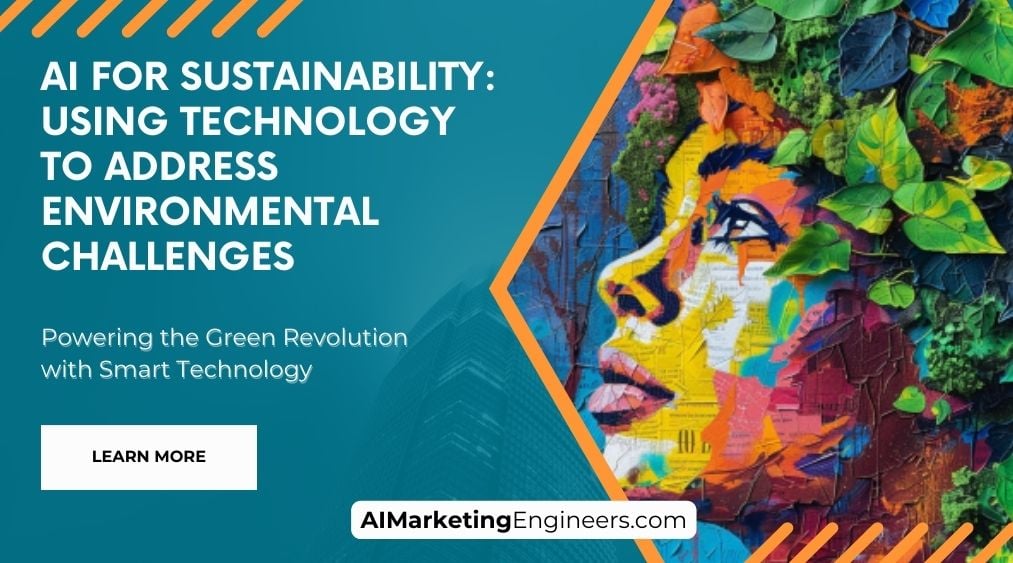Key Takeaways
✅ AI and machine learning technologies are not just buzzwords; they're tools reshaping our approach to Mother Earth's biggest headaches. They're about doing more with less, pinpointing problems, and tackling them head-on. Whether it's smart grids that squeeze every drop of efficiency out of energy production or algorithms that foresee environmental shifts and kick us into gear to adapt, this is where brainy tech meets green dreams. And it's not all about grand schemes; these insights pack a practical punch for businesses looking to trim down their eco-footprint and their bills.
✅ When it comes to our fellow Earth dwellers, whether they're furry, feathered, or finned, AI-driven solutions are like the new rangers on the biodiversity beat. Imagine cameras smarter than the sharpest eyes, picking up on changes in the wilderness, from a tree falling to an elephant's migratory tweak. They're keeping tabs, spotting the signs of trouble, and giving conservationists the lowdown to make the right calls. This is tech that doesn't just watch over nature; it's a guardian that gives us the intel to protect it like never before.
✅ Finally, let's talk about future-proofing our lifestyles with AI's knack for green innovation. From farms that adjust to every weather whim to energy systems that breathe in sun and wind to power our lives without a puff of pollution, this is the kind of progress that makes you think, "We've got this." It's about using clever coding to cut back on what we waste and upping our game where it counts. For businesses, it's an open-door to not just join the green brigade but to lead it with tech that's as kind to the planet as it is to their profits.
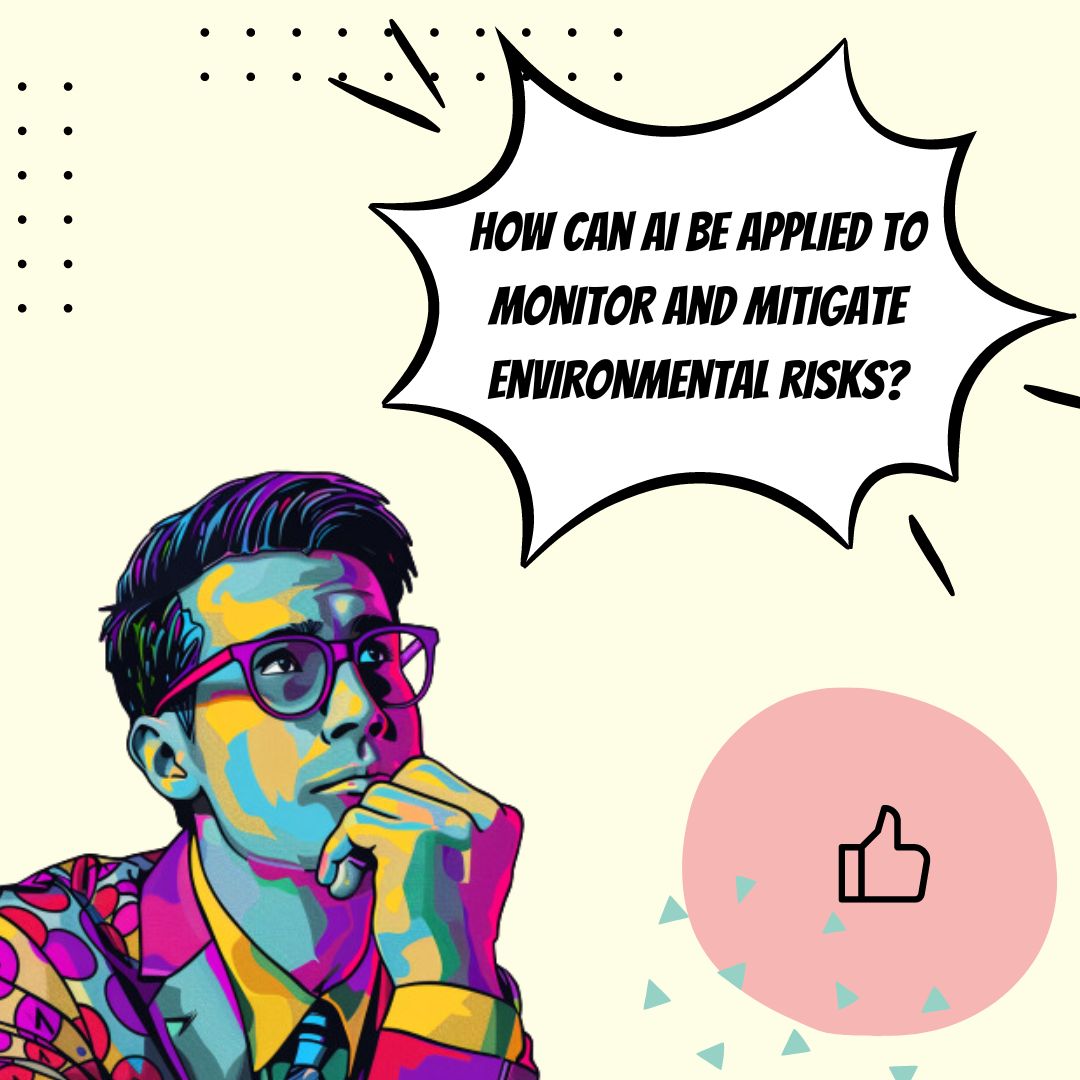
Introduction
Ever stopped to think about how each passing day, our beautiful blue and green marble seems a little less vibrant? That's our planet, folks, and she's sending out an SOS. It's clear as day we need to shift gears and steer towards a more sustainable future. But how do we pull off such a colossal U-turn? Here's where Artificial Intelligence (AI) swoops in, not as a heroic caped crusader, but as a powerhouse of smarts ready to take on environmental challenges.
In this story, we're going to walk through the digital forests of AI applications in sustainability, where cutting-edge tech plants seeds of hope. We'll marvel at the tools reading the Earth's tea leaves to foresee climatic shake-ups and tech titans turning sunbeams and gusts into clean, green energy. But it's not all smooth sailing; we'll also navigate through the rough waters of data dilemmas and ethical quandaries.
Are you curious about the mavericks and major leaps making AI and sustainability the dynamic duo of our era? Hold onto your hats. From Google's AI-powered wind whizzes to Microsoft's digital green thumb, we've got stories of success that'll make you a believer in a tech-tuned green future.
And let's not forget the real deal for all you business leaders out there; this isn't just about saving the planet. It's about smart moves that could make your cash registers sing while keeping it clean. So, are you ready to uncover secrets that can turbo-charge your company's green strategy? Stay tuned; we're about to spill the beans on AI for Sustainability: Using Technology to Address Environmental Challenges.

Top Statistics
| Statistic | Insight |
|---|---|
| Market Growth: The global market for AI in sustainability set to soar from $9.4 billion in 2020 to $49.3 billion by 2026. (Source: MarketsandMarkets, 2021) | This shows a remarkable trajectory, don't you think? It signals that companies are really betting big on AI as a lynchpin for their sustainability journey. |
| AI in Environmental Applications: Forecasts a CAGR of 33.3% from 2020 to 2026. (Source: MarketsandMarkets, 2021) | Now that's a number that makes you sit up straight. It tells us there's an escalating need for AI to not just power analytics but to become a beacon of environmental salvation. |
| Executives Betting on AI: 76% see AI as vital for their organization’s sustainability goals. (Source: Deloitte, 2020) | Three-quarters of the top brass agree on something. That's no small feat, revealing a strong consensus on AI's role in carving out a greener corporate path. |
| AI Adoption for Sustainability: In 2020, 68% of survey respondents were using AI to reach sustainability goals, primarily in tech, energy, and industrial sectors. (Source: PwC, 2020) | Imagine that, nearly 7 in 10 companies are harnessing AI as a powerful ally in the fight for a sustainable future. Witnessing such commitment across these pivotal industries is truly promising! |
| AI in Smart Agriculture: The market is expected to quadruple from $1.1 billion in 2020 to $4.0 billion by 2026. (Source: MarketsandMarkets, 2021) | This growth isn't just good news for tech savvies and environmentalists. Farmers, global food chains, and ultimately each one of us could reap the benefits of AI-powered farms. Isn't that something to look forward to? |
AI: A Lifeline for Our Planet's Future
Have you ever thought about how the same tech that recommends your next favorite song could help save our planet? Yeah, it's a bit of a leap, but let's connect the dots together. The world's environment is coughing and spluttering—it's in pretty rough shape. Artificial Intelligence (AI) has stepped up as an unexpected hero, armed with data and algorithms, ready to take on some of today's biggest environmental challenges.
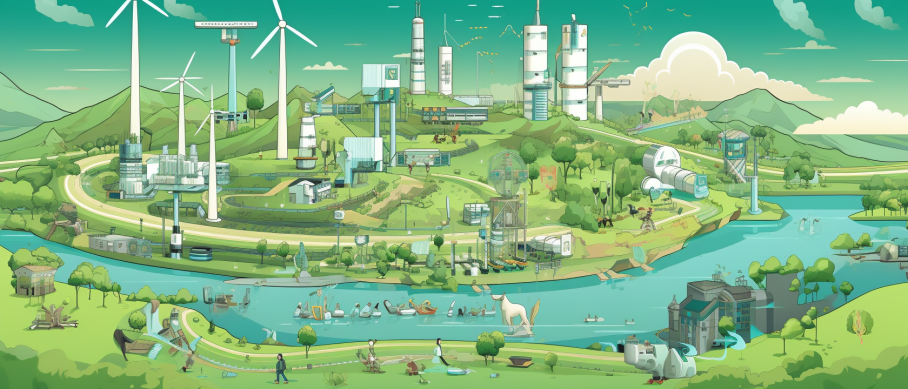
AI Applications in Sustainability: From Prediction to Protection
Picture this: computers that can predict the weather months ahead or foresee the ripple effects of a warming ocean. It's not science fiction! AI models are getting really good at climate change modeling and prediction. These digital brains digest piles of climate data to foresee changes in our environment. They're the next-level forecasters telling us how to prepare or even dodge future environmental bullets.
And imagine if our energy came from sources that play well with nature. That's where AI steps in, making renewable energy sources like wind and solar power work better and smarter. Think of it as a mastermind that knows when the wind will blow and the sun will shine, gearing up to maximize that clean, green power.
It doesn't stop there. AI is like a top-notch manager who's really into efficient resource management. From farming fields that use just the right amount of water, to reducing waste by knowing exactly what will be used - it's all about doing more with less. And here's a feel-good story: AI is also a wildlife hero, helping protect our furry and feathery friends through wildlife conservation and guarding their homes like an unflappable digital park ranger.
Advantages of AI in Sustainability: Smarter, Faster, Better
Let's face it, keeping tabs on Mother Nature is a big job. But with AI, we're talking about crunching big environmental data—accurate and lightning-fast. This leads to improved decision-making; because when it comes to looking after the planet, making the right call matters. A lot.
We're also seeing some serious cost savings and increased efficiency with AI. Cutting down on wasted resources not only helps the environment, it's easier on the wallet too. Plus, AI's crystal ball-like powers mean we can better predict and adapt to environmental changes. Amidst an ever-changing natural world, staying one step ahead is priceless.
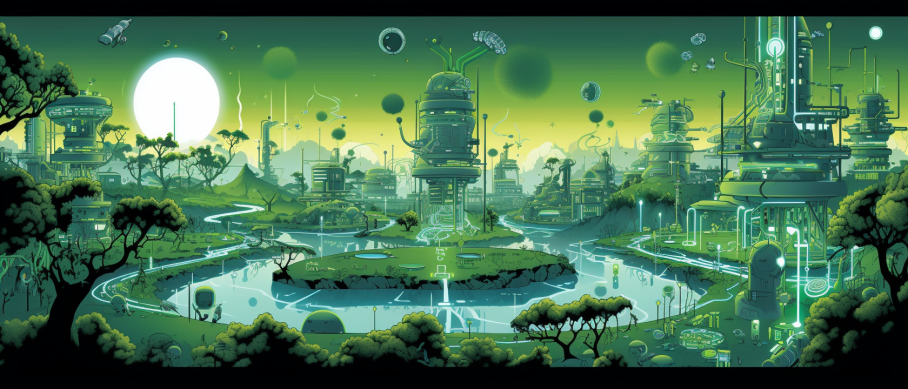
Challenges and Limitations: The Bumps on the Road to Green
But hey, it's not all smooth sailing. Getting our hands on consistent, quality data availability can trip us up. We need good data to make AI work its magic properly. And then there's algorithmic bias—when the AI's decision-making gets a little skewed. Not to mention, this tech party needs a solid infrastructure, and not everyone's invited yet. Dependence on technology can create a bit of a gap.
Also, we can't ignore the tough stuff like ethical considerations and the scary thought of potential misuse. With great power comes great responsibility, right? AI for the environment is a double-edged sword that needs to be handled with care.
Case Studies and Success Stories: AI's Wins for the World
Need some good news? There are some pretty neat projects out there. Google's AI-powered wind farms are using AI to make wind power even breezier. Then there's Microsoft's AI for Earth program, bankrolling the AI revolution in eco-watching. Or take IBM, dipping its big blue toes with AI-based water management solutions to keep our water clean and plentiful.
And for a heart-warmer, look at the work being done through Conservation AI, using smart cameras and algorithms to safeguard our wild buddies. These are the stories that give us a glimpse of an eco-cozy future.
The Future of AI and Sustainability: Bright and Green
So what's next? AI's toolkit is only getting bigger and better, with tech that's more refined and more capable. This could mean huge leaps for sustainable living. Imagine researchers, policymakers, and industry leads all joining hands around the AI campfire, working together for a greener tomorrow.
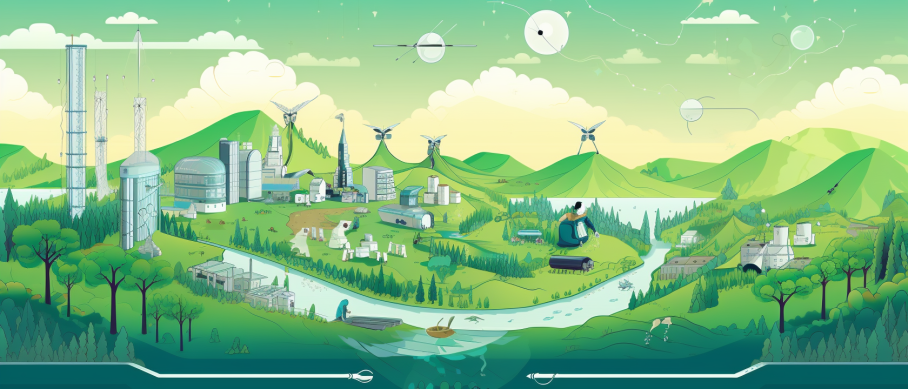
Plus, imagine a world where everyone knows about the power of AI — where support for these nifty tools isn't just a techy niche but a general cheer from the public stands. The potential is as vast as our blue skies. And it's not just a dream; it's a possibility that's unfolding right now.
Weaving AI into the fabric of sustainability, we're not just hoping for a better world; we're actively building it. It's an ongoing mission that's as exciting as it is essential. Let's keep our eyes on the prize: a more sustainable, smarter world, for us and the eons to come.
AI Marketing Engineers Recommendation
Recommendation 1: Incorporate AI in Resource Optimization: Businesses should utilize AI algorithms for enhancing their resource optimization. The available data tells us that AI can help significantly reduce waste by predicting the amount of raw material needed, thereby lowering the environmental impact. By using advanced predictive analytics, companies can streamline their production processes, minimize surplus, and enhance supply chain sustainability. Tools like Google Cloud's AI for circular economy are making waves in helping businesses achieve this.
Recommendation 2: Invest in AI for Energy Efficiency: An intelligent approach is adopting AI to decrease energy consumption in company operations. The trend is clear: AI systems can learn and identify patterns in energy usage, enabling automated adjustments that lead to substantive energy savings. By embracing smart grid technologies and AI-driven energy management systems, businesses can cut down on unnecessary power usage, diminish their carbon footprint, and exemplify corporate responsibility.
Recommendation 3: Deploy AI for Environmental Monitoring: Practical applications of AI, such as satellite imagery analysis and drones equipped with AI, are revolutionizing the way we monitor and protect our environment. Companies should tap into this technology to track deforestation, biodiversity, or changes in land use. The benefits are vast – beyond just complying with environmental regulations, these tools can inspire new CSR initiatives, keep stakeholders informed, and foster a greener brand image. Tools like Microsoft's AI for Earth offer remarkable capabilities for such purposes.

Relevant Links
Discover How AI Transforms Environmental Efforts
AI: An Unexpected Hero in Our Planet's Fight for the Future
Innovating for a Greener Tomorrow with AI
Driving Sustainable Change: The Role of AI in Eco-Innovation
AI's Contribution to Renewable Energies
Powering the Future: How AI Makes Renewable Energy Smarter
Wildlife Conservation in the Age of AI
Safeguarding Our Natural World: AI's Advancements in Wildlife Protection
Balancing Ethics and AI in Our Sustainable Future
The Ethical Frontier: Navigating AI's Role in Environmental Responsibility
Conclusion
So, what have we learned about the marriage of AI and sustainability? At the end of the day, it's all about using this smart technology to lend a hand in taking better care of our home, Earth. We've seen how AI can be a game-changer—from predicting climate change effects better than ever before, to squeezing the most energy out of every gust of wind, and even keeping an eye on our animal friends to make sure they're safe.
Yes, there are hiccups along the way. We can't ignore the data headaches or those uncomfortable ethical questions. But isn't it inspiring to see big names like Google and Microsoft, as well as brainy startups, all rolling up their sleeves to make things better? Each success story gives us a glimpse of what's possible when innovation meets intention.
The future of AI in sustainability is bright, but it's not just up to the tech wizzes to keep that light shining. We need the passion of environmentalists, the know-how of policymakers, and the support from people like you and me. What if we all got a bit more clued-up and threw our weight behind these tech solutions? Could we give Mother Nature a much-deserved breather?
Imagine a world where technology isn't just about the latest gadget or gizmo—it's about securing a future where we live in harmony with our environment. Are you ready to be part of this journey? Because every step we take towards AI-driven sustainability is a step towards a future where we aren't just surviving, but thriving.
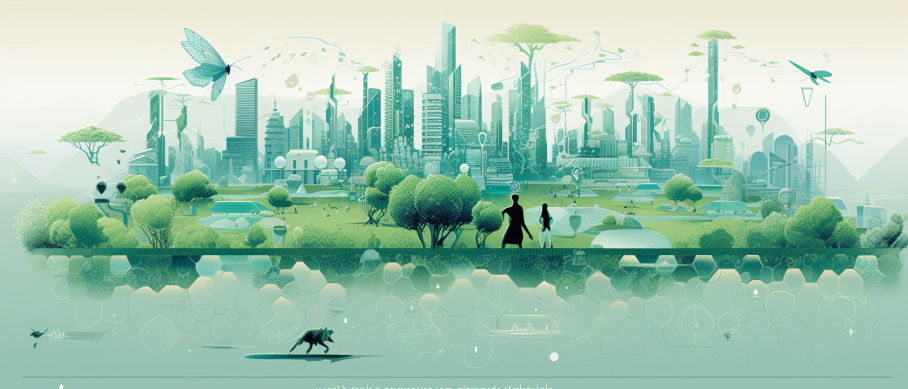
FAQs
Question 1: What is AI for Sustainability?
Answer: When we talk about AI for Sustainability, think of it like smart robots and computers getting together to fix up the environment. They learn by munching on data, figuring things out, and helping us decide the best way to look after our planet, from the air to the farms to the wild.
Question 2: How can AI contribute to environmental sustainability?
Answer: Imagine AI as a super-helpful friend for Mother Nature. It can make things run smoother and use less energy, keep an eye on our forests, help farms grow food without wasting water, and even predict the weather to fight climate change. Pretty neat, right?
Question 3: What are some practical applications of AI for Sustainability?
Answer: There are loads of ways AI rolls up its sleeves for the earth. It can tell when wind turbines need fixing, make farms smarter with water, keep an eye on wild animals, design buildings that stay cool or warm without guzzling power, and even sort recycling better.
Question 4: What are the challenges in implementing AI for Sustainability?
Answer: It's not all a walk in the park, though. Sometimes it's hard to find the right data, and we need brainy folks from different fields to work together. Plus, we've got to make sure it's all good for the community and not too pricey to set up.
Question 5: How can I learn more about AI for Sustainability?
Answer: Keen to dig deeper? You can hit the books or the web, checking out papers and groups focused on greening up tech. Keep up with hashtags on social media to catch the latest buzz. And hey, there are cool courses online to get you up to speed.
Question 6: What are some advanced topics in AI for Sustainability?
Answer: If you're up for a challenge, there's some cutting-edge stuff like making AI explain its eco-decisions, learning how to manage energy like a boss, keeping data private while saving the planet, forecasting climate stuff with fake-but-smart networks, and robots scouting the wild without stepping on any toes.
Question 7: How can I get involved in AI for Sustainability projects?
Answer: Want to roll up your sleeves and help out? You can join a group, team up with smart folks from different fields, hack away at challenges, lend a hand to eco orgs, or even score a gig where AI and green thumbs meet.

Academic References
- Rolnick, D., et al. (2019). Tackling Climate Change with Machine Learning. Nature. Picture this: a group of brainy folks got together and wrote an epic guide on how machine learning – that's computers doing smart things without being taught step by step – can be a game-changer for our climate. They said we could create better climate models, make our energy use smarter, and even figure out how to pull more of that pesky carbon out of the air.
- Schrag, D.P. (2020). Artificial Intelligence for Earth Systems Science. Annual Review of Earth and Planetary Sciences. Imagine having a crystal ball that could predict natural disasters and help us understand mother nature's mood swings. That’s pretty much what this paper talks about – using AI to get inside our planet's head and keep an eye on climate patterns, earthquakes, and all that jazz, making Earth seem a bit less mysterious.
- Zhou, B., et al. (2019). AI for Social Good: A Case Study on Climate Change. Proceedings of the AAAI Conference on AI for Social Good. This one's like a feel-good story, but it’s real. The authors gave us a sneak peek at how AI can do some good old-fashioned hero work by tackling climate change. It’s about using super-smarts to manage our energy better, respond to disasters quickly, and grow our food more sustainably. Heroic? Definitely.
- Zhang, J., et al. (2019). Machine Learning for Sustainable Development. Nature Sustainability. Grab your farmer's hat and your city planner's blueprint because this research dives into how machine learning can lead us down the path to a greener world. We're talking about farming techniques that won't hurt the planet, energy that won't run out, and cities that are a dream to live in – basically, a peek into a future we all want.
- Kaye, J., et al. (2019). AI for Earth: An Overview of Microsoft’s Approach to Ecological and Environmental Challenges. Computational Ecology and Software. Last but not least, let's throw the spotlight on the big guys at Microsoft. They rolled up their sleeves and are on a mission to support the environmental crusaders with AI tools. It’s like handing out super goggles and smart watches to researchers and saying, "Go make the world better!"
